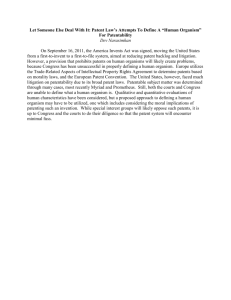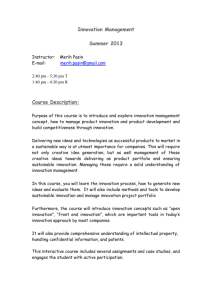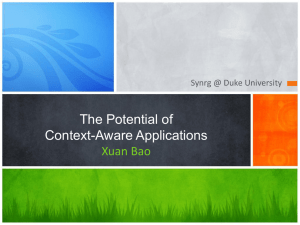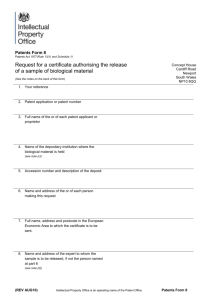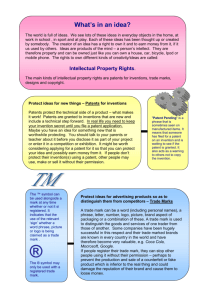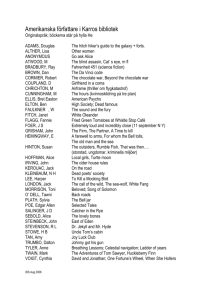Patent Protection - Association of Corporate Counsel
advertisement
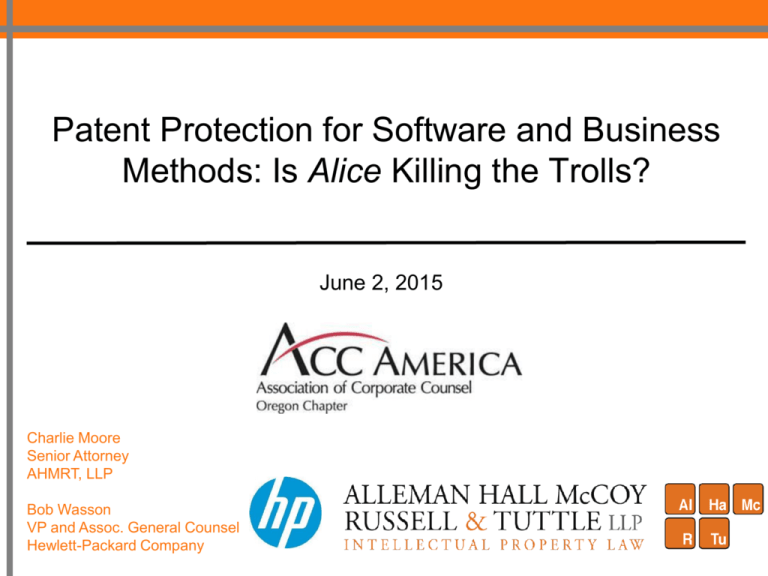
Patent Protection for Software and Business Methods: Is Alice Killing the Trolls? June 2, 2015 Charlie Moore Senior Attorney AHMRT, LLP Bob Wasson VP and Assoc. General Counsel Hewlett-Packard Company Roadmap • • • • • • • • The Alice Decision Patent Office Response – Uncertainty Rules Post-Alice Prosecution and Drafting U.S. Companies’ Response Covered Business Methods Litigation Effects Legislative Fixes Q&A 2 A reminder: The opinions expressed are those of the presenters and do not necessarily reflect the views of AHMRT, LLP, its clients, Hewlett-Packard Company or any of its affiliates. 3 What can you patent after Alice? “The idea was, when the Court took the case, that we would finally have an answer to the question whether software can be patented under U.S. law. To say we did not get an answer is to miss the depth of the nonanswer we did get.” - Prof. Robert Merges, Berkeley Center for Law & Technology “A majority of the software patents being litigated right now, I think, are invalid under Alice.” - Prof. Mark Lemley, Stanford University, Sept. 2014 4 Judicial decisions Gottschalk v. Benson (1972) (BCD number to binary – preempt formula) Parker v. Flook (1978) (alarm limits – insig. post solution activity) Alice v. CLS Bank (2014) (Intermediated settlement) Diamond v. Diehr (1981) (curing rubber) Ultramercial (Fed. Cir. 2014) (view ads for content) Bilski v. Kappos (2010) (risk hedging) Mayo v. Prometheus (2012) (drug amount effectiveness) DDR Holdings (Fed. Cir. 2014) 5 Alice v. CLS Bank (2014) - - - Alice Corporation - Australian company established by former McKinsey manager - 11 U.S. patents Alice patents broadly cover ways in which parties can contract electronically and anonymously with one another in real time and secure environment to: - Hedge known risks; - Invest in known risks for profit; - Lend/borrow from one another; and - Exchange value between one another Approached CLS Bank in 2002 CLS filed DJ in 2007 6 Alice v. CLS Bank (2014) Method of Performing Electronic Escrow Create Electronic Records Track Multiple Transactions Issue Simultaneous Instructions Claim 33 of U.S. Patent No. 5,970,479: 33. A method of exchanging obligations as between parties, each party holding a credit record and a debit record with an exchange institution, the credit records and debit records for exchange of predetermined obligations, the method comprising the steps of: (a) creating a shadow credit record and a shadow debit record for each stakeholder party to be held independently by a supervisory institution from the exchange institutions; (b) obtaining from each exchange institution a start-of-day balance for each shadow credit record and shadow debit record; (c) for every transaction resulting in an exchange obligation, the supervisory institution adjusting each respective party’s shadow credit record or shadow debit record, allowing only these transactions that do not result in the value of the shadow debit record being less than the value of the shadow credit record at any time, each said adjustment taking place in chronological order; and (d) at the end-of-day, the supervisory institution instructing ones of the exchange institutions to exchange credits or debits to the credit record and debit record of the respective parties in accordance with the adjustments of the said permitted transactions, the credits and debits being irrevocable, time invariant obligations placed on the exchange institutions. 7 Alice v. CLS Bank (2014) Issue: Are computer-implemented inventions patent-eligible under 35 U.S.C. § 101? • Parties stipulated claims are “computerimplemented” • • • Computer-Implemented Escrow Several claims do not recite a computer or any form of computer implementation District Court: All claims are patent-ineligible Federal Circuit: No majority opinion • Method and CRM claims are patent-ineligible; split on system claims, so lower court ruling maintained Judge(s) Test Lourie (Dyk, Prost, Reyna, Wallach) Significantly more (consider “inventive concept”) Rader (Moore) Meaningful limitations to a specific application of an abstract idea Meaningful limitations (joined Rader on test) Back to Basics Linn (O’Malley) Newman Rise and Fall Together? Yes Method Claims CRM Claims System Claims Ineligible Ineligible Ineligible No Ineligible Ineligible Eligible Yes Eligible Eligible Eligible Yes Eligible Eligible Eligible 8 Are computer-implemented inventions patenteligible? Meaningful Limits: Additional Limitations: Computer implementation must limit scope ofImplementation: claim and Claim needs additional limitations that Specific Always patent eligible: contribute to achieving intended result claim to specific practical Claim must be limited to direct a Computer-implemented application specific way of implementing an inventions always fall outside Test: ideaabstract with a computer idea (1) whether computer implementation claimed withexception Test: whether use of computer is integral sufficient particularity & specificity to ensure meaningful to claimed invention or, alternatively, Test:No Claim must have inventive principled reason to draw limits on claim scope; and whether recited use of computer is concept (elements) to ensure distinctions hardware (2) computer implementation must be significant between“insignificant post-solution activity” patent in practice amounts to contributor to achieve intended result and software tackedcarried on to steps of business method significantly more than patent • Technological functions on the abstract idea out by software could be Claims eligible: rise & fall together Additional Limitations: Meaningful Limits: Computer Always patent Specific Implementation: Consider claim as a whole • Conventional or obvious steps implemented through computer Consider all combined claim elements as inventive Claim needs additional implementation must be claims Computer-implemented Claim must be limited to a Claims rise & fall together limitationsinsufficient thathardware direct claim to inventions concept always fall outside specific way of implementing an Raderwith sufficient particularity and Generalapplication non-specific steps specificity that specific• practical to ensure meaningful abstract idea exception idea with a computer doComputer not significantly limit claims implementation, limits on scope of claim and Claim must have inventive scope insufficient Computer implementation, however the effort, Use of computer mustminimal be significantly contribute to concept (elements) to ensure to particular however minimal the effort, definitively separates achieving intended result integral• toLimiting claimed invention patent in practice amounts to technological environment definitively separates technological implementation from significantly more than patent insufficient technological implementation idea itself on the abstract idea Newman from idea itself Limited eligibility Always eligible Lourie+ Newman Rader Rader Rader Lourie+ Alice v. CLS Bank (2014) Holding: Two-part test: 1. Are the claims directed to a patent-ineligible concept? 2. Is there an inventive concept in the claim? i.e., an element or combination of elements that in practice amounts to significantly more than a patent upon the ineligible concept itself. 10 Alice v. CLS Bank (2014) Part 1: Test for Abstract Ideas • Examples of abstract ideas – fundamental economic practices (Bilski), certain methods of organizing human activities, “an idea of itself”, mathematical relationships and formulas (Benson, Flook) • No clear standard provided – “we need not labor to delimit the precise contours of the ‘abstract ideas’ category” Application of the Test • Claims recite an abstract idea – no meaningful distinction between risk hedging in Bilski and intermediated settlement in this case. Alice v. CLS Bank (2014) Part 2: 2: Significantly More • • • • Insufficient Appending conventional steps at a high level of generality (Mayo) Stating the idea + “apply it” (Mayo) Mere recitation of a generic computer (Benson) Merely limiting to a “particular technological environment” (Flook) May Be Sufficient • • Improvements to an existing technology or technical field (Diehr) Improvements to the functioning of the computer itself Application of the Test • Alice’s claims are unpatentable, as they simply recite the concept of intermediated settlement as performed by a generic computer DDR Holdings v. Hotels.com (Fed. Cir. 2014) Post Alice: Software and even E-Commerce patents are viable - - - Patent addressed problem of retaining website visitors Held – Patent eligible subject matter The claims “do not merely recite the performance of some business practice known from the pre-Internet world along with the requirement to perform it on the Internet. Instead, the claimed solution is necessarily rooted in computer technology in order to overcome a problem specifically arising in the realm of computer networks.” “The claims “do not broadly and generically claim ‘use of the Internet’ to perform an abstract business practice (with insignificant added activity…the claims at issue here specify how interactions with the Internet are manipulated to yield a desired result—a result that overrides the routine and conventional sequence of events ordinarily triggered by the click of a hyperlink.” “It is also clear that he claims at issue do not attempt to preempt every application of the idea of increasing sales by making two web pages look the same, or of any other variant suggested by NLG. Rather, they recite a specific way to automate the creation of a composite web page by an “outsource provider” that incorporates elements from multiple sources in order to solve a problem faced by websites on the Internet.” 13 DDR Holdings v. Hotels.com (Fed. Cir. 2014) Claim 19 of U.S. Patent No. 7,818,399: 19. A system useful in an outsource provider serving web pages offering commercial opportunities, the system comprising: (a) a computer store containing data, for each of a plurality of first web pages, defining a plurality of visually perceptible elements, which visually perceptible elements correspond to the plurality of first web pages; (i) wherein each of the first web pages belongs to one of a plurality of web page owners; (ii) wherein each of the first web pages displays at least one active link associated with a commerce object associated with a buying opportunity of a selected one of a plurality of merchants; and (iii) wherein the selected merchant, the outsource provider, and the owner of the first web page displaying the associated link are each third parties with respect to one other; (b) a computer server at the outsource provider, which computer server is coupled to the com- puter store and programmed to: (i) receive from the web browser of a computer user a signal indicating activation of one of the links displayed by one of the first web pages; (ii) automatically identify as the source page the one of the first web pages on which the link has been activated; (iii) in response to identification of the source page, automatically retrieve the stored data corresponding to the source page; and (iv) using the data retrieved, automatically generate and transmit to the web browser a second web page that displays: (A) information associated with the commerce object associated with the link that has been activated, and (B) the plurality of visually perceptible elements visually corresponding to the source page. 14 Patent Office Response • In Fall 2014 up to 75% rejection rate based on Alice in ecommerce-related Art Units • Other art units (e.g., automobiles) see 5-7% rejection rates • Examiner’s afraid to allow applications, as they face high scrutiny • Applicants and Examiners are both searching to figure out (1) what is abstract under Alice, and (2) how much “something more” it takes to render subject matter eligible under 101 • Both sides are confused, have higher work burden 15 Post-Alice Prosecution • Use Alice 2 part frame work – Part 1 - Argue claim as whole (all elements) not abstract – Part 2 - Argue claim has “something more” • Rely upon Diamond v. Diehr – – – – Real world input Transformative processing Real world output That achieves an advantage over the prior art • Rely upon Gottshalk – Doesn’t remove a generic technology from the public domain • Add harmless detail, such as available hardware sensors receiving input, input/output ports, etc. 16 Post-Alice Drafting • Avoid claims to: – – – – Fundamental economic activity (Bilski, etc.) Mathematical formulas (Benson) Signals (In re Nuitjen) Device Profiles (Digitech (with respect to the claims directed to the “device profile”) – Pure Data Structures • In re Warmerdam - data structure not patent eligible • In re Lowry - functional data structure on a memory is patent eligible – Games (Planet Bingo) 17 Post-Alice Drafting • Direct claims and description to specific, practical applications • Avoid e-commerce words like game, order, commerce, auction, etc. • Avoid overly broad or abstract characterizations of the invention in the description and arguments • Avoid buzzwords like “formula”, “equation”, and “algorithm” in the description • Use caution when reciting mathematical equations in the claims • Explain how the invention solves a technical problem in the description • Use language from the cases in your description or arguments – e.g., “embodiments improve the functioning of a computer by …” • Draft for an uncertain future: Recognize that patents have 20-year term and patent-eligibility law may well change during this time 18 U.S. Companies’ Response • On legal/policy question US companies see this differently: – High tech companies that get sued a lot on software patents – Pharma companies – Companies who assert software patents (e.g., operating companies, NPEs, Universities, defunct businesses with valuable patent portfolios) • In portfolio development: – Improve technical character of patents, particularly software patents – Perhaps file fewer patent applications on items that could be regarded as mental steps, financial algorithms, or methods of organizing human activity – Recognize that patents have a 20 year term from priority and that legal standards concerning patentable subject matter will likely change during this time 19 U.S. Companies’ Response • In Litigation: – As a defendant • Increasing use of 101 invalidity arguments early in litigation. • CBM (Covered Business Method Review) – As a plaintiff • Consider alternative forums • ITC and Germany gaining in popularity 20 Covered Business Method (CBM) Review - Potentially powerful - CBM patent claims “a method, apparatus, or operation used in the practice, administration, or management of a financial product or service” - Only party charged with infringement of a CBM patent can initiate CBM challenge (receiving cease and desist letter likely to be considered charge of infringement) - May assert any grounds for invalidity - May be filed only when post-grant review unavailable (e.g., nine months after issuance). - Estoppel provisions less extensive than post-grant review (extends only to grounds actually asserted, not to grounds that reasonably could have been asserted) 21 Litigation Effects – Curbing Trolls? • PwC study reports number of patent lawsuits in 2014 decreased by 13%1 • But data collected Oct. 31, 2013 – Sept. 30, 2014; Alice decision issued June 2014. • Also, new patent lawsuits decreased 8% Jan – May 2014 (before Alice) as compared to same period in 20132 • Number of patents invalidated by District Courts under § 101 July – Dec. 2014 was more than double in all of 2013. • Other newly available procedures (IPR, CBM) to attack patents • Impact on NPE business model? Many believe Yes – More difficult to obtain venture funding of NPE suits – Vague/overly-broad patents have been critical to ensnare many defendants – “Nuisance value” model less viable 1 “2015 Patent Litigation Study”, May 2015, PricewaterhouseCoopers LLP Case Trends and the Business of Litigation”, February 5, 2015, Lex Machina 2“Patent 22 Legislative Fixes - Unlikely to improve at Supreme Court - PTO probably lacks authority - Professional organizations, including Intellectual Property Owners and AIPLA, are working on a proposed amendment to section 101 to address these issues. - One proposal amends 101 to exclude considerations found in 102, 103, and 112. - Another proposal seeks to amend 101 in line with European standards such as: - Susceptible of industrial application and - Invention must be of a “technical character” (i.e, “a technical solution to a technical problem”) 23 THANK YOU 24
